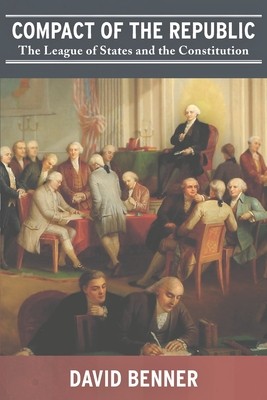
- We will send in 10–14 business days.
- Author: David Benner
- Publisher: Life & Liberty Publishing Group
- ISBN-10: 0692484264
- ISBN-13: 9780692484265
- Format: 15.2 x 22.9 x 2.1 cm, minkšti viršeliai
- Language: English
- SAVE -10% with code: EXTRA
Reviews
Description
The United States Constitution was a concerted response to an age of tyrannical kings and highly centralized government. As history reveals, such political authority had to be challenged directly - by local units and causes - to preserve liberty and ensure public happiness.
Compact of the Republic demonstrates that the Constitution did not impose a nationalist, superlative central government, and was not ratified by "one American people" in the aggregate. Instead, the document was the product of a multi-party arrangement, where the states remained the masters of their own creation and the pillars of the federal system. In Compact of the Republic, historian David Benner: *Reveals that representatives were assured that delegated power could be reclaimed by the states following acts of federal overreach and usurpation *Explains the historical foundation behind the Bill of Rights, and traces the limitations on government to the actions of malevolent kings *Proves the Constitution acknowledges the states in the plural, as a collection of sovereign societies with varied interests *Demonstrates that the "elastic clauses" were clearly explained during the ratification campaign, and leave no room for modern reinterpretation *Describes how the federal judiciary now overturns state laws it has no jurisdiction over, to the contrary of its original scope of power *Explains why Thomas Jefferson and James Madison believed that unconstitutional federal laws had to be opposed, nullified, and obstructed by the states *Illustrates that ratification was secured only by convincing opponents of the Constitution that the document would produce a nominal general government with limited, enumerated powersEXTRA 10 % discount with code: EXTRA
The promotion ends in 22d.21:53:27
The discount code is valid when purchasing from 10 €. Discounts do not stack.
- Author: David Benner
- Publisher: Life & Liberty Publishing Group
- ISBN-10: 0692484264
- ISBN-13: 9780692484265
- Format: 15.2 x 22.9 x 2.1 cm, minkšti viršeliai
- Language: English English
The United States Constitution was a concerted response to an age of tyrannical kings and highly centralized government. As history reveals, such political authority had to be challenged directly - by local units and causes - to preserve liberty and ensure public happiness.
Compact of the Republic demonstrates that the Constitution did not impose a nationalist, superlative central government, and was not ratified by "one American people" in the aggregate. Instead, the document was the product of a multi-party arrangement, where the states remained the masters of their own creation and the pillars of the federal system. In Compact of the Republic, historian David Benner: *Reveals that representatives were assured that delegated power could be reclaimed by the states following acts of federal overreach and usurpation *Explains the historical foundation behind the Bill of Rights, and traces the limitations on government to the actions of malevolent kings *Proves the Constitution acknowledges the states in the plural, as a collection of sovereign societies with varied interests *Demonstrates that the "elastic clauses" were clearly explained during the ratification campaign, and leave no room for modern reinterpretation *Describes how the federal judiciary now overturns state laws it has no jurisdiction over, to the contrary of its original scope of power *Explains why Thomas Jefferson and James Madison believed that unconstitutional federal laws had to be opposed, nullified, and obstructed by the states *Illustrates that ratification was secured only by convincing opponents of the Constitution that the document would produce a nominal general government with limited, enumerated powers

Reviews